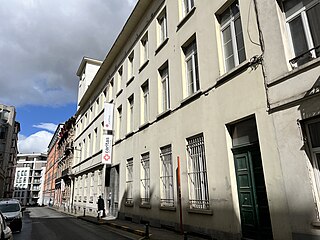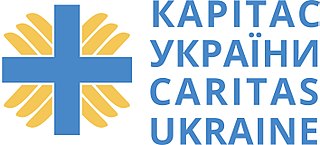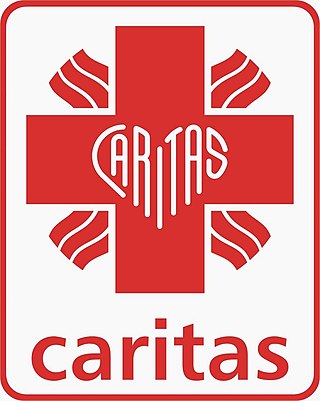
Lesbian, gay, bisexual, transgender, and queer (LGBTQ) rights in Switzerland are some of the most progressive by world standards. Social attitudes and the legal situation have liberalised at an increasing pace since the 1940s, in parallel to the situation in Europe and the Western world more generally. Legislation providing for same-sex marriage, same-sex adoption, and IVF access was accepted by 64% of voters in a referendum on 26 September 2021, and entered into force on 1 July 2022.

Caritas Europa is a European confederation of Catholic social service providers and international development and humanitarian relief organisations operating in Europe. It is one of the seven regions of Caritas Internationalis.

Swiss Solidarity is a Swiss nonprofit organization. Since 1946, Swiss Solidarity has embodied the solidarity reflex of the Swiss population. Together with SRG SSR, it mobilises the population and collects donations in the event of major natural disasters and conflicts, as well as for children's aid and for vulnerable people in Switzerland. The foundation is independent and ensures that donations are used carefully and efficiently in a transparent manner.
The FIMCAP, which is short for Fédération Internationale des Mouvements Catholiques d'Action Paroissiale, is an umbrella organization for Catholic youth organizations. Its 31 member organizations are based in 28 countries. The FIMCAP was founded in 1962 and is recognised as an official Catholic organization by the Dicastery for Laity, Family and Life. FIMCAP is also a full member of the European Youth Forum.

Caritas Internationalis is a confederation of 162 national Catholic relief, development and social service organisations operating in over 200 countries and territories worldwide. The name Caritas Internationalis refers to both the global network of Caritas organisations and to its general secretariat based in the Vatican City in Rome, Italy.

Ueli Leuenberger is a Swiss politician affiliated with the Green Party.
Caritas Austria is an Austrian social aid organisation of the Roman Catholic Church, founded in 1903. It consists of a national office and nine regional diocesan Caritas organisations, all of which are legally independent.

Solidar Suisse is a Swiss non-profit organization with headquarters in Zurich. It also has a French-speaking Swiss branch in Lausanne and an association in Geneva, Solidar Suisse Genève. As an NGO, it fights for global justice and against extreme inequality. It campaigns for decent working conditions, democratic participation and social justice.

The Swiss Refugee Council is the umbrella organization of six aid organizations active in Switzerland in the field of asylum, namely Caritas Switzerland, Entraide protestante suisse (EPER), l'Œuvre suisse d'entraide ouvrière (OSEO), Union suisse des comités d'entraide juive (USEJ), the Swiss section of Amnesty International, and the Swiss divisions of the Salvation Army.

Caritas Ukraine is a Ukrainian Catholic not-for-profit and humanitarian relief organisation.

Caritas Poland is a Polish Catholic not-for-profit social welfare and humanitarian relief organisation. It is a service of the Polish Bishops' Conference and the largest social welfare and charitable organisation in the country.

Caritas Luxembourg is the name of a range of nonprofit organisations operating in Luxembourg. They are grouped together under the umbrella of the Caritas Luxembourg Confederation. These organisations work across various sectors in Luxembourg, focusing on vulnerable populations including migrants, refugees, the homeless and other individuals living in poverty. Other programmes focus on children and youth. A department is dedicated to the implementation of international cooperation and humanitarian projects abroad.

Caritas Jordan is a Jordanian Catholic charitable organisation.

Caritas Syria is a Syrian Catholic charitable and humanitarian aid organisation.

Caritas Sweden is a Catholic aid organisation from Sweden. It is part of the European network of Caritas organisations Caritas Europa, as well of the global confederation Caritas Internationalis.
Caritas Albania is an Albanian Catholic not-for-profit social welfare and humanitarian relief organisation. It is a service of the Albanian Bishops' Conference.

Caritas Slovakia is a not-for-profit social welfare organisation in Slovakia. It is a service of the Catholic Church in Slovakia.

Caritas Hellas is a not-for-profit social welfare and humanitarian organisation in Greece. It is a service of the Catholic Church in Greece and a member of both Caritas Europa and Caritas Internationalis.
Caritas Bulgaria or officially the National Catholic Federation Caritas - Bulgaria is a not-for-profit social welfare organisation in Bulgaria. It implements social activities in support of vulnerable people in society and is a service of the Bulgarian Catholic Church.

Caritas Hungary is a not-for-profit social welfare organisation in Hungary. It is a service of the Catholic Church in Hungary.
















